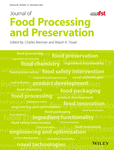Efficacy of Withania coagulans fruit extract as a coagulant for Mozzarella cheese at different coagulation temperatures from curd formation to pizza top
Abstract
Withania coagulans is a shrub that has milk-clotting activity. Its coagulation efficiency at different concentrations and incubation temperatures was measured for Mozzarella cheese from curd formation to its application on the pizza top. Curd made at higher W. coagulans concentration (1%) has less coagulation time (1272.99 ± 96.68 s), viscosity (148.58 ± 9.25 Pa s), pH (5.89 ± 0.05), and yield (7.87 ± 0.53%) as compared to rest of samples. Increasing temperature (39°C) also decreased coagulation time (1599.19 ± 380.06 s), viscosity (146.56 ± 15.51 Pa s), pH (6.01 ± 0.17), and yield (8.87 ± 0.48%) of curd. W. coagulans at 0.2% concentration showed caseinolytic activity (78.83 ± 1.97%) very close to rennet (84.12 ± 2.3%). High W. coagulans and temperature conditions lead to the grainy texture that results in the loss of proteins, fats, and moisture from the cheese. Highest protein (21.89 ± 0.8%; 23.39 ± 2.15%), fat (17.64 ± 0.62%; 18.50 ± 0.32%), and moisture (43.55 ± 8.01%; 50.00 ± 6.13%) were observed in Mozzarella cheese at 0.2% W. coagulans concentration and 33°C temperature, respectively. This study showed that 0.2% extract of W. coagulans can be used to clot the milk for cheese production at 33°C.
Novelty impact statement
The interest in plant-based coagulant consumption has been growing because of the rennet shortage and religious matters of some vegetarian people. A plant-based coagulant from Withania coagulans has been reported for its milk-clotting activity, but its behavior for Mozzarella cheese production from curd formation to its application on pizza topping needs detailed study for its use on an industrial scale. In this study, W. coagulans behavior was studied during curd formation. Its caseinolytic and proteolytic activities in comparison to rennet were studied. Mozzarella cheese physicochemical and functional characteristics on pizza topping were also described in this research.
CONFLICT OF INTEREST
The authors have declared no conflicts of interest for this article.
Open Research
DATA AVAILABILITY STATEMENT
The data that support the findings of this study are available from the corresponding author upon reasonable request.




